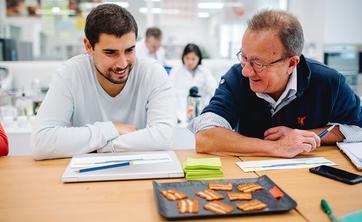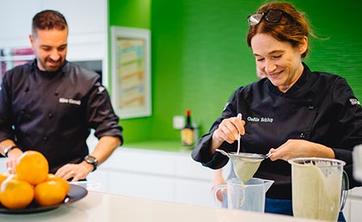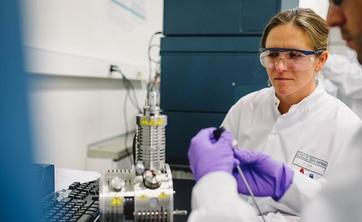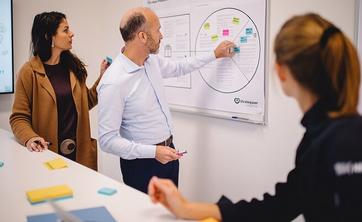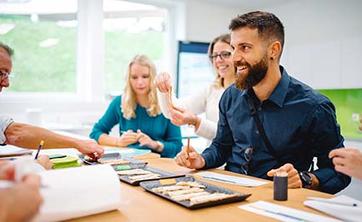Sustainable technologies

With over one third of human greenhouse gas emissions caused by food production, we need to change the way we grow, produce and choose food.
At Nestlé we're using science and technology to develop products that are good for you and the planet. This is in line with our commitment to net zero and our support for regeneration. This involves supporting farmers to help them cultivate high-quality, lower carbon ingredients, while respecting nature.
Using our recipe and cookery expertise, we then combine these ingredients to create nutritious, tasty and safe products produced and packaged as sustainably as possible.
Here's what we're doing across the value chain.
Agricultural sciences expertise
Recently, we announced the creation of Nestlé Institute of Agricultural Sciences, to assess and combine science-based solutions to improve the nutritional and sensorial qualities of agricultural raw materials, as well as their environmental impact.
Work at the institute will focus on three areas.
-
Plant science Our plant scientists are working to breed new coffee varieties. These provide higher yields and have a lower carbon footprint, plus better disease and drought resistance.
In cocoa, our plant science team has provided farmers with high-quality cocoa plantlets, to revitalize fields with more disease-resistant, higher yielding trees.
We're also working to identify suitable pulses and grains, which offer low carbon, plant-based alternatives to meat, seafood and dairy -
Agricultural systems Safeguarding soil health is vital for regenerative agriculture, and we want to deliver solutions we can scale for farmers.
We're piloting methods to better assess soil quality, while looking at crop protection methods and zero tillage farming. The goal is to improve soil health, strengthen biodiversity and reduce emissions. -
Dairy livestock Dairy agriculture is Nestlé's largest single emissions source, and we're assessing solutions that include feed supplements to reduce cows' methane emissions and better manure management.
Working with farmers, universities, suppliers and startups, we're prioritizing animal welfare, regulatory compliance and the production of nutritious and great quality milk and dairy products.
All of this agricultural sciences work means nothing if Nestlé product developers can't make informed ingredient choices. We need to accurately estimate the carbon footprint of specific categories, brands and ingredients to target reductions.
Our R&D experts have developed processes and tools to make this possible.
Recent launches show the journey we're on. Sensational Vuna uses a combination of pea and wheat protein.
VEGGie is based on soy protein, as is our Sensational Burger, which has around 80% lower emissions versus a regular beef burger. We've also launched vegan versions of established, mainstream products. These include KitKat V, Milo and Nescafé beverages. Our vegan Carnation line is made using oat and rice flour.


While we're working to grow ingredients sustainably, we also want to use the whole crop, so we can reduce agricultural waste and nutrient loss, plus associated greenhouse gas emissions. Valorizing side streams is a key part of this.
This approach creates shared value beyond Nestlé, as it generates new potential revenues for farmers and startups.
Take the example of coffee. To help run our factories, we incinerate waste coffee grounds to generate power or to create biogas. We're also exploring the use of cellulose fibers from spent grounds to produce biodegradable packaging.


Where our ingredients are made into foods, we're developing technologies and processes to reduce emissions, and replace fossil fuels with green or alternative energy sources.
Our engineers are exploring a range of novel technologies. We are:
- Looking at new ways to roast, extract and freeze dry coffee.
- Developing energy-saving pizza ovens.
- Applying energy recovery technologies to the creation of granulated products.
- Trialing biomass and electric heaters to improve spray drying efficiency across our nutrition business.


Next generation packaging
Once Nestlé products roll off the lines, we want to package them more sustainably. So, we're exploring recyclable, reusable, biodegradable and compostable packaging solutions - while reducing the amount of packaging we use.
This work is being driven by Nestlé Institute of Packaging Sciences, which evaluates the safety and functionality of various sustainable packaging materials. The institute works with experts across our sites, as well as with suppliers, research institutions and startups.
Recently, brands including Nesquik, Smarties, Maggi, Quality Street and KitKat have launched paper packaging. Nespresso is pioneering home compostable capsules, and Nescafé Dolce Gusto has introduced paper-based pods with its new Neo system.
We've made prototypes for Perrier bottles using enzymatic recycling technology, and we're piloting circular economy models, such as zero packaging or returnable packs.




